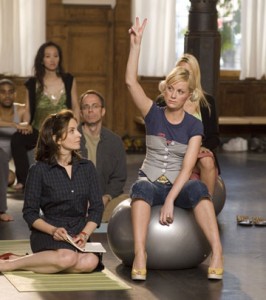Baby Mama

Amy Poehler telling the group about her upcoming bodily function
When you read about Tina Fey and Amy Poehler wanting to work together, you should be wary. Because it usually means they’ll find a script that happens to have two female leads, but doesn’t suit their comedic talents at all.
Such is the problem with Baby Mama. Both bring their personalities to the film, but they don’t mesh with the edgeless script and boring, clichéd characters, laid out as complete stereotypes. Fey is the uptight barren businesswoman. Poehler is the white trash baby factory Fey hires as a surrogate.
But Fey and Poehler are too smart for their characters, so there end up being a lot of inconsistencies. Poehler (whose husband, Will Arnett, starred in a goofy surrogate mother comedy just last year, The Brothers Solomon) in particular has a hard time mixing her lowbrow material (peeing in a sink) with the attempts at intelligence (discussions about architecture). The result is that scenes have no comedic momentum, despite individual funny lines, and the pacing is brutal, not helped by the very flat, sitcomy direction by writer Michael McCullers. The film even falls into the comedy plot trap, where the last half wants to give us both story and heart, at the expense of the jokes, which all but disappear by act III. Nowhere is this more evident than in the pointless detour of romancing Fey by Greg Kinnear, who seems limoed in from another movie entirely, probably starring Sandra Bullock.
Steve Martin, as Fey’s boss, a pretentious, ponytailed, spiritual foodie has some good lines, and Fey is as likable as she is on 30 Rock. But in Baby Mama, the camera, like with 30 Rock (where the camera spends oodles of screen time aimed at her cleavage), is awfully distracted by Fey’s body parts, it’s like a paean to her legs. It’s proof that the filmmakers forgot to focus on the important parts, being funny.



